Friday Feb 13, 2026
Friday Feb 13, 2026
Tuesday, 22 February 2022 02:33 - - {{hitsCtrl.values.hits}}
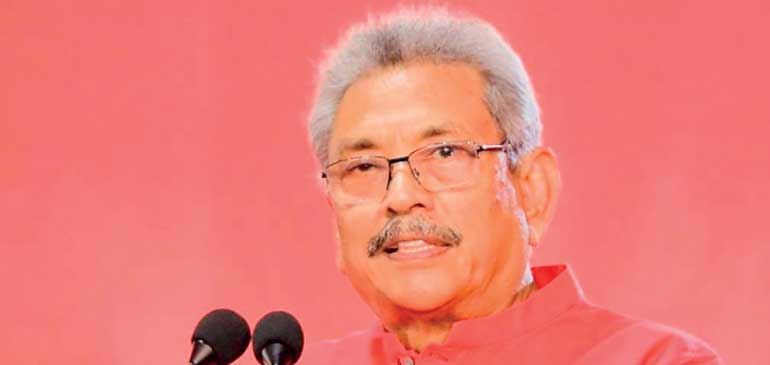
President Gotabaya Rajapaksa
On 28 February 2022 at the 49th session of UN Council for Human Rights, its High Commissioner Michelle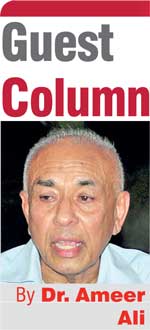 Bachelet would submit her report card on Sri Lanka’s performance over human rights and other associated issues, in accordance with the landmark resolution 46/1 passed a year ago, a copy of which was received by the Government and response dispatched a couple of days ago. That resolution was passed with 22 votes in favour, 11 against and 14 abstentions. For the Rajapaksa Government what happened in 2021 was a debacle resulting from amateurish diplomacy and unsolicited jingoism.
Bachelet would submit her report card on Sri Lanka’s performance over human rights and other associated issues, in accordance with the landmark resolution 46/1 passed a year ago, a copy of which was received by the Government and response dispatched a couple of days ago. That resolution was passed with 22 votes in favour, 11 against and 14 abstentions. For the Rajapaksa Government what happened in 2021 was a debacle resulting from amateurish diplomacy and unsolicited jingoism.
To fulfil the stipulations contained in that resolution, few measures were introduced in the parliament such as to reform the PTA and the Internal Security Act. These were cosmetic in essence and halfhearted in commitment and were aimed at satisfying the form and not the substance of what was required.
Similarly, the delayed release on bail such victims as the Muslim poet Ahnaf Jazeem and human rights lawyer Hejaaz Hizbullah, who were arrested on trump up charges in the first place, and permission granted to Muslims to bury the COVID-dead on condition that they should do so only in one exclusively designated cemetery in a far-off place in the Eastern Province, demonstrate not a genuine willingness to improve the regime’s human rights record, but a display of the deceptive side of its Janus face. Geneva gave a second chance for the regime to come clean. Will it pass the test? Leaked documents indicate a negative answer.
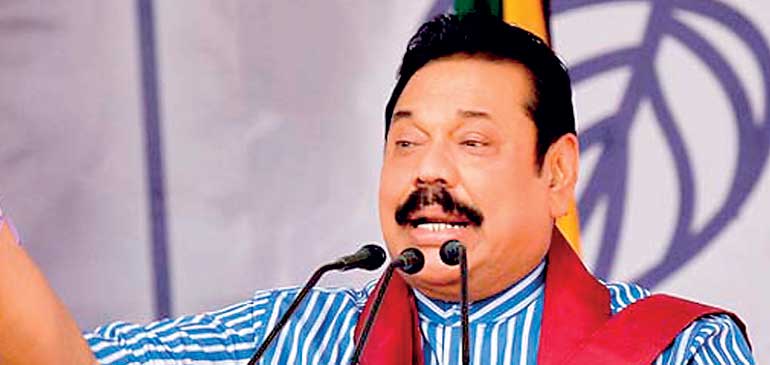
Prime Minister Mahinda Rajapaksa
Yielding to pressures from UNHCR or any other foreign forces, would be a climb down to the regime’s and particularly its President’s self-portrayal as defenders of Sri Lanka’s sovereignty and Sinhala-Buddhist ethno-nationalism. It was GR’s determination and promise to his voters to protect and strengthen Sinhala-Buddhist supremacy that caused violation of human rights to start with. In the name of protecting national sovereignty and strengthening internal security all religious and ethnic minorities with international links fell under the radar of President GR’s Defence Ministry. Therefore, to expect him and his regime to relent in the face of UNHCR pressure and dilute their supremacist ideology to accommodate the minorities on equal terms as partners in national development is to expect the impossible.
In a recent press conference, Foreign Minister G.L. Peiris, while appealing to UNHCR to understand and appreciate measures taken by his government’s “internally structured mechanism” to tackle and resolve issues raised by resolution 46/1, reminded the apex body “not to substitute the country’s parliament”. He and the Minister of Justice reiterated that those issues could only be resolved in the long-run. How long would that long-run be is anybody’s guess. But the problem with the parliament is that it has lost all its powers and become virtually a rubber stamp approving whatever diktat that comes out of the President’s office.
GR on different occasions had warned international bodies like the UN, to respect his country’s sovereignty and its elected government, and not to interfere in its domestic affairs. It was that jingoism which made foreign powers take serious notice of the cries for help that came from the regime’s victims. Resolution 46/1 was the result of that appeal. More resolutions could follow if the regime’s hawkishness continues. However, given the clash of interests among members of international bodies like UNHCR, there is a possibility that the regime may get away this time with a slap on the wrist. But what if it fails the test?
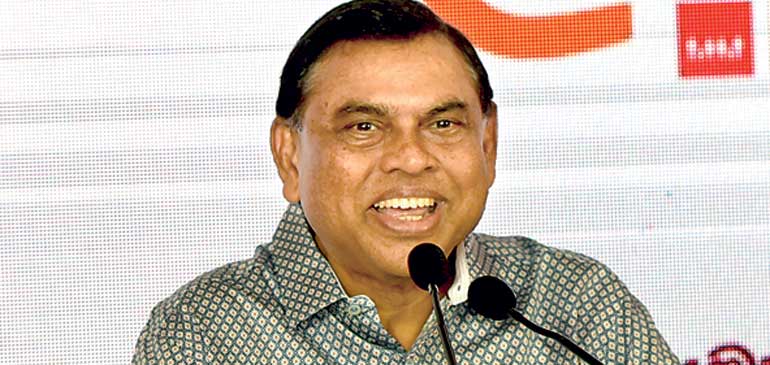
Finance Minister Basil Rajapaksa
Following President GR’s 2022 Independence Day address, Prime Minister MR challenged his opponents for an electoral showdown. The fact that he issued that challenge from Anuradhapura, the Buddhist cultural capital, has its own significance. However, one would have thought that it was not the right time for MR to call for any poll, national, provincial or local, because of his government’s disastrous handling of the economy and peoples’ dissatisfaction. With a bankrupt treasury running dry of precious dollars to service national debt, let alone settle it, and pay for vital imports; with rampant corruption in governance and mafia groups dictating policies to government; and with bickering divisions within the ruling coalition, government’s popularity has ebbed to the bottom.
However, MR, a seasoned politician and master of electoral manoeuvres seems to have detected in the gloomy environment an opportunity for a surprise victory. What could have been the reasons for his optimism?
As far as the regime is concerned, economy, corruption, foreign debt and internal divisions are all nonissues. For instance, when a TV journalist recently interviewed Finance Minister Basil Rajapaksa (BR) and asked him whether there was an economic crisis in the country, BR dismissed that question by answering that it was a global crisis, that it had been present in Sri Lanka for a long time, and that it had only worsened recently. Surprisingly, he did not blame the pandemic this time. Even GR on an earlier occasion considered the current economic difficulties as short-term challenges that would be overcome in the long-term. Once again one is not clear of the length of that long-term.
Likewise, corruption is not new but endemic to this country, and borrowing and spending has been the pastime for all governments. When did this country ever have a surplus budget except once when Dr. N.M. Perera was Finance Minister in Sirimavo’s leftist coalition? MR knows all this, and he could point his finger at his opponents as sharply as they are doing at him. And more importantly, none of the parties that are vying for power has so far presented any alternative plan or strategy for a quick economic recovery. Even the manifesto of NPP/JVP was more an ideological criticism of economic liberalism and free market than a categorical framework of practical measures to overcome the crisis.
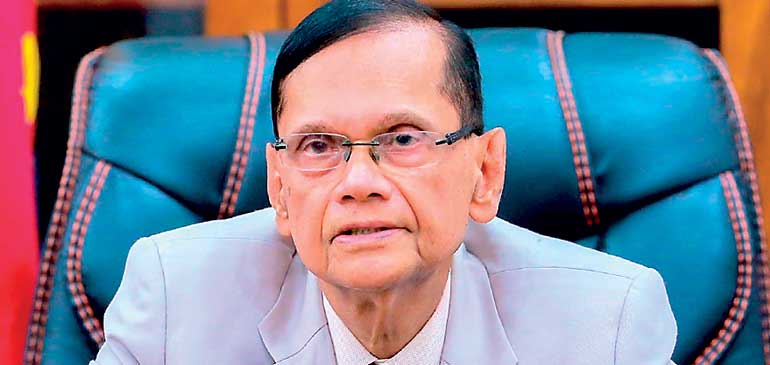
Foreign Minister Prof. G.L. Peiris
In addition, there is one crucial issue on which all Opposition parties, except the Tamil and Muslim parties, remain rather muted and would dare not challenge the regime openly. Even the NPP/JVP has not been honest and categorical on this issue. This is the commitment by the Rajapaksas to protect and promote Sinhala-Buddhist supremacy and its preparedness to make Sri Lanka a Buddhist state eventually. For example, when Gnanasara Thero, the obstreperous Secretary General of Bodu Bala Sena, declared in Kandy in 2018 that Sinhala Buddhists are the true owners of this country and that the minorities are long-term tenants allowed to live at the behest of the majority, none of the opposition members in parliament including those from JVP refuted that claim.
Now that the same Gnanasara is heading a task force to advise GR on the infamous one-country-one-law (OCOL) agenda, attempts are under way to homogenise the country’s cultural heterogeneity and achieve not unity but uniformity in diversity. The forthcoming constitution may facilitate the possibility of reaching this worrying destiny. Unless the Opposition declares its categorical commitment to do away with Sinhala Buddhist ethno-nationalism and its majoritarian counterpart, Sri Lanka would go the same way as Modi’s Hindutva India. MR obviously sees in this Buddhist demagoguery backed by hardline members of Sangha the winning trick to beat his opponents, and hence his confidence and challenge.
In the meantime, the Foreign Minister seems to be optimistic about the outcome in Geneva. But the prognosis does not look healthy. However, if the regime failed the test that may be turned into another propaganda weapon by its apparatchiks to warn the masses against external threats and the need for a strong man like GR to lead the country. BR also in that interview reiterated this point and said that the country should be thankful for having strong leaders like GR and MR at this troubled time. A disunited Opposition without any concrete alternative to offer would be caught on the hop when the time of choice arrives.
(The writer is a Professor at the School of Business and Governance, Murdoch University, Western Australia.)